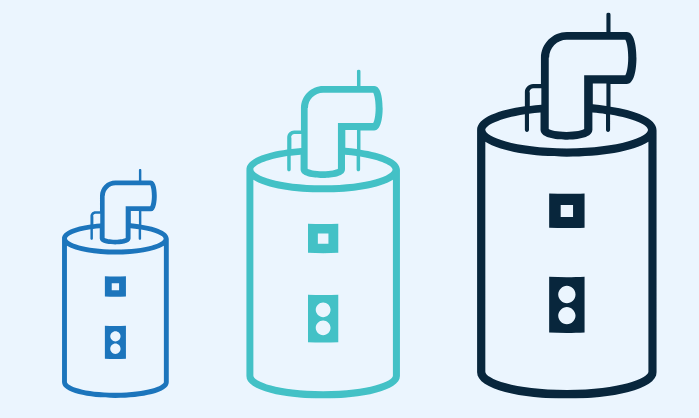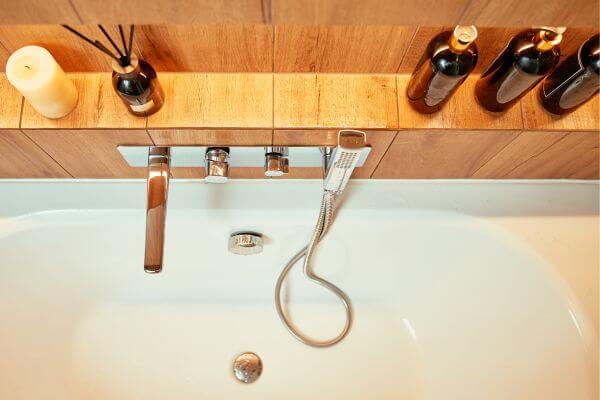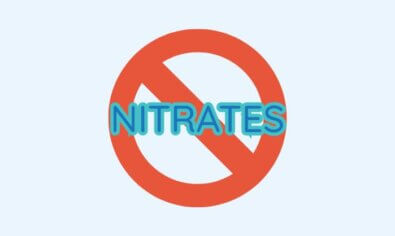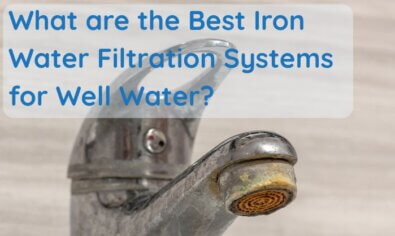What Water Heater Size Is Best for Your Home or Business?
Choosing the right water heater size can be tough. Too small, and you’re stuck with cold showers. Too big, and you’re wasting energy and money.
Thus, making the right choice about your water heater size is crucial. And so, here’s what to think about before you buy:
- Different water heater sizes are suited for different properties.
- Homes or apartments need a smaller water heater tank size.
- Big places like restaurants or hotels need bigger tanks, such as a 75-gallon water heater or more.
- To pick the right size, think about how many people and how they use hot water. More people mean a larger water heater size.
Our guide will walk you through the common sizes. Plus, considerations for homes versus businesses, and the key factors that will help you find the perfect fit.

Understanding Water Heater Size: More Than Just Gallons
When we talk about water heater size, we’re usually referring to the tank’s capacity in gallons.
However, it’s not *just* about the tank size. The recovery rate — how quickly the heater can reheat water — also plays a vital role.
A smaller tank with a fast recovery rate might be sufficient for a small house. In contrast, a large household or business may need a big tank with a slower recovery rate.
Next, let’s dive into the common sizes and what they’re typically used for.
Common Water Heater Tank Sizes for Homes
Here are the most common hot water heater sizes for home use:
- 20-Gallon Water Heater: This is often the smallest water heater available. It’s ideal for very small apartments, cabins, or single-person dwellings where hot water demands are minimal.
Keep in mind, the average shower in the US lasts 8.2 minutes and uses 17.2 gallons.
- 30-Gallon Water Heater: A slight step up, the 30-gallon tank is suited for small apartments or homes with moderate hot water usage.
These can handle a couple of back-to-back showers. But it might struggle with some demands. Such as showering and laundry at the same time.
- 40-Gallon Water Heater: The 40-gallon water heater is a popular choice for small families (2-3 people).
In fact, it’s a good balance between capacity and energy efficiency. It can handle most tasks. However, lots of hot water usage at once may lead to running out.
- 50-Gallon Water Heater: The 50-gallon water heater is the most common size for average-sized families (3-5 people).
It provides enough for heavy hot water demands. Also, it is a reliable choice for typical household needs.
- 75-Gallon Water Heater: For larger families (5+ people), bigger water heater sizes are often needed.
These units provide ample hot water. Even during peak usage times. Like in the morning when everyone is getting ready.
- 80-Gallon and Larger: Beyond 75 gallons, you’ll find tanks up to 100 gallons or more.
So, these are generally needed for mansions, group homes, or large families.
Homes vs. Businesses: Sizing Considerations
Of course, the water heater size you need for your home is likely quite different from the size you need for a business.
Companies must consider factors such as the type of business. As well as the number of employees and the frequency of hot water usage.
- Small Offices: A small office with only a few employees might get by with a 30- or 40-gallon tank. Chiefly used for handwashing and cleaning.
- Restaurants: Restaurants have substantial hot water demands for dishwashing, food preparation, and cleaning. Truly, they often require multiple large tanks or a high-capacity tankless system.
- Hotels: Hotels need to provide hot water for many guest rooms, heavy-duty laundry, and swimming pools in some regions. So, these need a large-scale system. Frequently with multiple high-capacity tanks.
- Salons and Spas: To be sure, salons and spas use hot water for hair washing, spa treatments, and cleaning. Therefore, the best water heater size depends on the number of stations and the volume of clients they serve.
- Laundromats: These have extremely high hot water demands. They require industrial-sized water heaters or a series of large tanks. Specifically, to keep up with the constant use of washing machines.
How To Choose the Right Water Heater Size
Beyond the scope of your home or business, several other factors can influence your choice of water heater size.
Number of Occupants
Usually, this is the most obvious factor. The more people living in a home or working in a business, the greater the demand for hot water.
Peak Hour Demand
Consider the times of day when hot water usage is at its highest.
For example, in a home, this might be in the morning when everyone is showering. In a restaurant, it might be during the lunch and dinner rushes.
Number of Hot Water Fixtures
Count the number of showers, sinks, dishwashers, washing machines, and other appliances that use hot water. The more fixtures, the greater the overall demand.

First Hour Rating (FHR)
The First Hour Rating (FHR) is really important. You see, that’s how much hot water a water heater can deliver in the first hour of use.
This is a useful metric. It helps you compare different models. Then, it ensures you choose one that can meet your peak hour demand.
Protect Your Water Heater from Hard Water – Get a Free Test!
Hard water can lead to expensive repairs for your water heater. Get a free water test today to check your water quality and learn how to prevent damage to your heater and home.

Fuel Type
The type of fuel your water heater uses (gas, electric, solar, etc.) can also affect the size and efficiency of the unit.
Gas water heaters generally have faster recovery rates than electric models, meaning you might be able to get away with a slightly smaller tank.
Space Constraints
The physical space available for your water heater is a practical consideration. If you have limited space, you might need to opt for a smaller tank or a tankless system.
Energy Efficiency
Look for energy-efficient models with high Energy Factor (EF) ratings.
This will help you save money on your energy bills and reduce your environmental impact. The Department of Energy provides great information about energy efficiency standards for water heaters.
Budget
In addition, the cost of a water heater can vary significantly depending on the size, type, and efficiency. Hence, set a budget and research different options to find the best value for your money.
Tankless vs. Tank Water Heaters
An alternative to traditional tank water heaters is the tankless water heater. Alternatively, they’re known as an on-demand water heater.
In brief, tankless water heaters heat water only when you need it. They do not store hot water. This cuts down on loss associated with tank heaters. While they can be more expensive at first, they save money on your energy bills in the long run.
Tankless water heaters are based on the maximum flow rate (gallons per minute/ GPM). Our licensed plumbers can help you find the right water heater size for your house or business.
- Homes: A small home might only need a tankless water heater that provides 2-5 GPM. Larger homes with multiple bathrooms may require a unit that provides 8-10 GPM or more.
- Businesses: The GPM requirement for a business will depend on the type of business and the number of fixtures.
Restaurants and hotels will likely need multiple tankless water heaters. Or, potentially, a specialized commercial unit.
Professional Advice: When to Call an Expert
Choosing the right water heater size can be complicated. So, it’s always a good idea to consult with a qualified, licensed plumber.
We can help assess your specific needs. Then, we recommend the best water heater size for your home or business. Our professionals can also ensure that your new water heater is installed correctly and safely.
The Impact of Hard Water
Not to mention, hard water can truly affect the lifespan and efficiency of your water heater, no matter what size.
To clarify, minerals in hard water (calcium and magnesium) can build up inside the tank, forming scale. This scale reduces the water heater’s efficiency and can eventually lead to premature failure.
If you have hard water, consider installing a water softener. Truly, this will protect your water heater and prolong its lifespan. A water softener can also improve the quality of your hot water and prevent scale buildup in your plumbing fixtures.
Extending the Life of Your Water Heater
Now, you’ve chosen the right water heater size and have it installed. Next, there are several things you can do to extend its lifespan and maintain its efficiency:
- First, flush the tank regularly: Flushing the tank removes sediment and scale buildup, which can improve efficiency and prolong the life of the water heater.
- Then, insulate the tank: Insulating your hot water tank can reduce heat loss and save energy.
- Also, lower the thermostat: Lowering the thermostat to 120°F (49°C) can save energy and reduce the risk of scalding.
- Finally, have it professionally serviced: Schedule regular maintenance checks with a qualified plumber to identify and address any potential problems before they become major issues.
Finding the Perfect Fit
In conclusion, it’s crucial to pick the right water heater size for your home or business. This is an investment in your comfort and efficiency.
So, consider the factors outlined in this guide. Then you can make an informed decision and select a water heater that meets your specific needs.
Whether you’re outfitting a cozy apartment or a bustling business, understanding water heater sizes will ensure you have plenty of hot water when you need it, without wasting energy or money.
Get invaluable professional advice — call the experts at Angel Water today!
Protect Your Water Heater – Schedule an Appointment Now!
Prevent hard water damage and extend the life of your water heater. Schedule an appointment with our specialists today to explore water softening solutions for your home.


